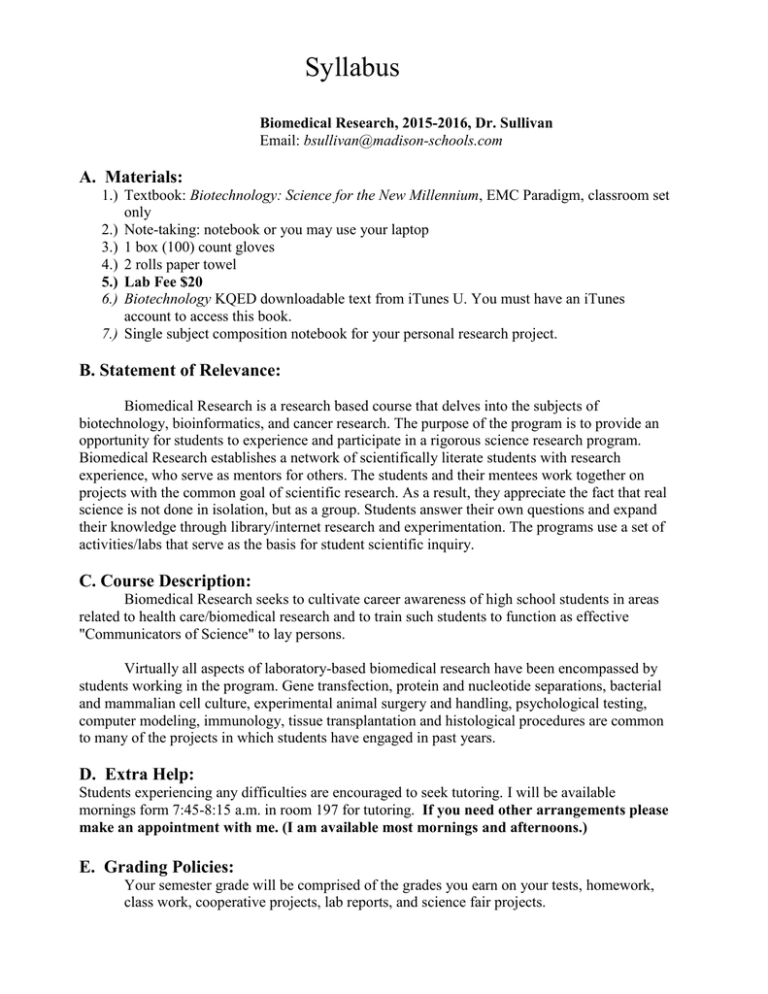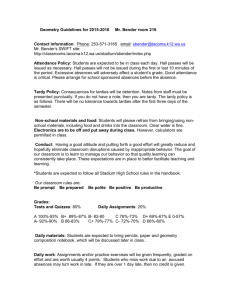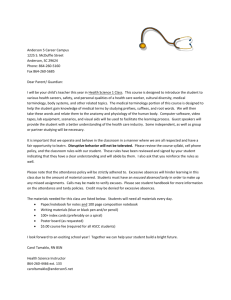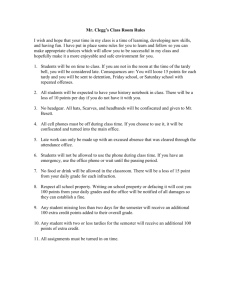Syllabus - Madison County Schools
advertisement

Syllabus Biomedical Research, 2015-2016, Dr. Sullivan Email: bsullivan@madison-schools.com A. Materials: 1.) Textbook: Biotechnology: Science for the New Millennium, EMC Paradigm, classroom set only 2.) Note-taking: notebook or you may use your laptop 3.) 1 box (100) count gloves 4.) 2 rolls paper towel 5.) Lab Fee $20 6.) Biotechnology KQED downloadable text from iTunes U. You must have an iTunes account to access this book. 7.) Single subject composition notebook for your personal research project. B. Statement of Relevance: Biomedical Research is a research based course that delves into the subjects of biotechnology, bioinformatics, and cancer research. The purpose of the program is to provide an opportunity for students to experience and participate in a rigorous science research program. Biomedical Research establishes a network of scientifically literate students with research experience, who serve as mentors for others. The students and their mentees work together on projects with the common goal of scientific research. As a result, they appreciate the fact that real science is not done in isolation, but as a group. Students answer their own questions and expand their knowledge through library/internet research and experimentation. The programs use a set of activities/labs that serve as the basis for student scientific inquiry. C. Course Description: Biomedical Research seeks to cultivate career awareness of high school students in areas related to health care/biomedical research and to train such students to function as effective "Communicators of Science" to lay persons. Virtually all aspects of laboratory-based biomedical research have been encompassed by students working in the program. Gene transfection, protein and nucleotide separations, bacterial and mammalian cell culture, experimental animal surgery and handling, psychological testing, computer modeling, immunology, tissue transplantation and histological procedures are common to many of the projects in which students have engaged in past years. D. Extra Help: Students experiencing any difficulties are encouraged to seek tutoring. I will be available mornings form 7:45-8:15 a.m. in room 197 for tutoring. If you need other arrangements please make an appointment with me. (I am available most mornings and afternoons.) E. Grading Policies: Your semester grade will be comprised of the grades you earn on your tests, homework, class work, cooperative projects, lab reports, and science fair projects. Grade Category Tests and Lab Reports / Practicums Daily work, Homework, and Quizzes *2 quizzes = 1 test Grade weight 65% 35% Your SEMESTER grade will be determined as follows: 1st 9 weeks grade – 40% 2nd 9 weeks grade-40% Semester Exam-20% FINAL GRADE = average of 1st and 2nd semester grades. Homework will be assigned regularly. As in any science course, the student should allow time on a daily basis to complete homework, lab reports and study. LATE WORK will NOT be accepted. Excused absences will be allowed to makeup work according to school policy. Check the homework link on my website for work. No other makeup work will be accepted during the semester. The daily class work grade is earned if the following takes place: (1)Acceptable classroom behavior (2) Pay attention in class (no head on desk or sleeping) (3) Work only on Biomedical Research (no English, math, history, etc.) (4) Complete assignments in class (5) Participate in group work (6) Bring and maintain your notebook (7) Bring your textbook to class Grading Scale 90-100 A 80-89 B 70-79 C 65-69 D 0-64 F F. Exemptions for Final Exam: 1. Grade: 90-100 80-89 70-79 Number of allowed absences 4 2 0 NO OFFICE REFERRALS NO OFFICE REFERRALS NO OFFICE REFERRALS 2. Medical excuses do count towards absences for exemptions! G. Absences 1. 11 absences are allowed the entire year. 2. On the 12th absence you lose credit for the class. 3. Medical excuses will NOT count toward the 12th absence policy. 4. You must return to class with a pass before the tardy bell on the day you return. 5. If you miss class for school business, you are responsible for getting the work that you missed. H. TARDIES 1. You are allowed 3 tardies per semester, which result in no punishment. 2. The division principal will handle all punishment when you have 4+ tardies. 3. If you are 25 minutes late, it counts as an absence. Also, if you check out 25 minutes before the class is over, it counts as an absence. 4. 3 tardies = 1 absences 5. The only excused tardies that do not count against you are: bus permits, administrator pass and medical pass. 6. Returning to class after the lunch tardy bell still counts as a tardy. Take care of personal business during lunch as you will not be allowed to leave the room after lunch. I. MAKE UP WORK- Excessive absences can have an adverse effect on your grade. 1. Make up work is only accepted from students who have excused absences. 2. Make-up work is your responsibility! 3. As noted in the Student Handbook, make up work is due the 2nd class meeting after your return to school. 4. Class work and Homework will be posted on my teacher webpage. There is no excuse not to know what material you missed. 5. Test: If you were present when a test has been assigned, you are required to make up that test when you return to class. 6. If you miss class for school business, you are responsible for getting the work that you missed. 7. Class work and homework It is the student’s responsibility to determine the work missed. The assignments are located online. All make-up work should be placed in the appropriate class folder on the student table. Work that was due on the day of absence is due upon return. 8. Tests and quizzes Tests will made up before school or the following class period. Wednesday mornings from 7:30-8:20 will be reserved for making up of tests. POP Quizzes will not have to be made up. 9. Labs If you are absent on the day of a lab, you will be required to thoroughly understand the lab we performed. You will take a makeup lab quiz. All missed work that is not made up in the allotted time will result in a zero. J. General Classroom Rules 1. Your homework must be in the basket before the tardy bell rings. 2. You must be sitting in your desk when the tardy bell rings. If you not in your assigned desk you will be counted tardy. 3. Raise your hand to be acknowledged. 4. Put your cell phone AWAY (as in NOT in use) 5. Do not leave your seat without permission. 6. There is absolutely no food or beverages allowed in the class at any time. The presence of food, beverages, or gum during a lab will result in a grade of zero for the day. K. Consequences When a student exhibits inappropriate behavior, the following steps will be taken: A.) First Offense-warning B.) Second Offense- conference with student C.) Third Offense- detention hall and/or call parents D.) Fourth Offense- office referral Severe misbehavior will result in an immediate office referral. L. Independent Research Projects Each student scientist in Biomedical Research is REQUIRED to conduct independent research, collect and analyze data from the research, and present their work to their peers and research scientists. Student scientists will participate in a number of in class activities. It will be through these activities that students may identify research areas to explore independently. Your work will be entered into competitions such as the MCHS Science Fair, the Mississippi Academy of Sciences Conference, and the Mississippi Regional Junior Science and Humanities Symposium. M. Community Science Each year the biomedical research class makes presentations to the Mayor and Board of Aldermen on various topics of research. We will again make presentations. The date(s) of the presentations are to be determined once the calendar for the Board of Aldermen is set. N. Syllabus/Pacing Guide Day Topic Class introduction/ safety review 1 Research basics/science fair project 2 3 4 5 6 7 8 9 10 11 rules/Book Talk Identifying problems/Writing hypotheses/Identifying Variables/ Book Talk Lab: Collecting, Organizing and Presenting Data/ Book Talk Using Statistics: Chi-squared test/ Book Talk Writing lab reports/APA / Book Talk Test: Safety & Lab Reports History of Biomedical Research Cell division review Cancer: History/Issues/Research/Treatment Test: BMR history/DNA/Cell Division/Cancer Assessment Topic approval Written hypotheses Identified variables Data sheets Class work Written lab report Test Timeline development Quiz Test 12 13 14 15 16 17 18 19 20 21 22 23 24 25 26 27 28 29 30 31 32 33 34 35 36 37 38 39 40 41 42 43 44 45 46 47 48 Lab: Micropipetting skills DNA: review of structure DNA: replication & synthesis Lab: DNA collection Lab: DNA fingerprinting/ Gel electrophoresis Lab: PCR DNA: protein synthesis Lab: protein synthesis Test: DNA & Proteins A&P: Skeletal, Muscular, & Integumentary systems A&P: Circulatory system: Cardiovascular + Lymphatic A&P: Nervous System & Respiratory System A&P: Digestive System & Excretory System Lab: Vital Statistics Test: Systems Lab: Understanding X-rays/determining fracture Prokaryotic vs Eukaryotic Cells Bacteria: Types / Lab: bacterial collection Lab: bacterial growth Bacterial Reproduction Lab: Identifying types of bacteria Lab: Bacterial Transformation Lab: Bacterial Transformation Diseases: bacterial Diseases: viral Lab: ELISA test for HIV (simulation) Diseases: prion, fungal, others Diseases: Genetic Diseases: Genetic Diseases: Genetic Lab: Disease identification Review & Exam Lab practicum 2nd Book Talk 2nd Book Talk Science Fair presentations Science Fair presentations Presentation Presentation Presentation Presentation Lab practicum Lab report Lab practicum Class work Lab practicum Test Lab Data Collection Test Quiz Quiz Lab practicum Lab report Lab report Quiz Quiz Presentation Lab questions 49 50 51 52 53 54 55 56 57 Training: Community Heath Advocate Training: Community Health Advocate Training: Community Health Advocate CHA: Health Screening for Study Body Case study: atherosclerosis CHA: Health Screening for Teachers PBL: treating atherosclerosis PBL: treating atherosclerosis Field trip to UMMC 58 59 60 PBL: treating atherosclerosis Blood: types & components Lab: Simulated blood typing Discussion: Wrong blood typing CHA: Health Screening for Students Lab: Identifying your blood type (optional)/ transfusions Lab: making slides CHA: Health Screening for Teachers Test: Blood CHA: Health Screening for Students Cancer in depth Lab: Morphology of Cancer Cells Setting up Surveys Surveying the Student Body Analyzing survey results Field Trip TBD 61 62 63 64 65 66 67 68 69 70 71 72 73 74 75 76 77 78 79 80 81 82 83 84 85 86 PBL: case study PBL: solution PBL: solution PBL: solution presentation Forensics: blood analysis/ spatter Forensics: hair Forensics: DNA analysis Forensics: other evidence Forensics: crime scene evidence collection Forensics: court room evidence Book talk #3 Book talk #3 Book talk #3 Exam review Leading station Leading station Project Project Raise funds for bus & lunch Project Presentations Quiz Lab questions Leading station Lab questions Lab practicum Leading station Test Quiz Lab questions Survey development Survey application Raise funds for trip & lunch Presentations practicum Presentations 87 Final Exams * Once a week during the spring semester, selected students will participate in Discovery U at UMMC. These students will be graded on the attendance. Those remaining at MCHS will receive the regular class scores. Classroom Syllabus & Procedure Agreement My signature indicates that I have read the classroom syllabus. I also acknowledge that I have received and read a copy of our classroom procedures. Also, please indicate whether or not your student’s picture may appear on my website. Student Name: __________________________________________________________ Student Signature: _______________________________________________________ My student’s picture may be placed on the teacher’s website. Please circle: Yes No Parent Signature: ______________________________________________________ Date: _________________________________________________________________ Print this page only, sign and submit to Dr. Sullivan.





